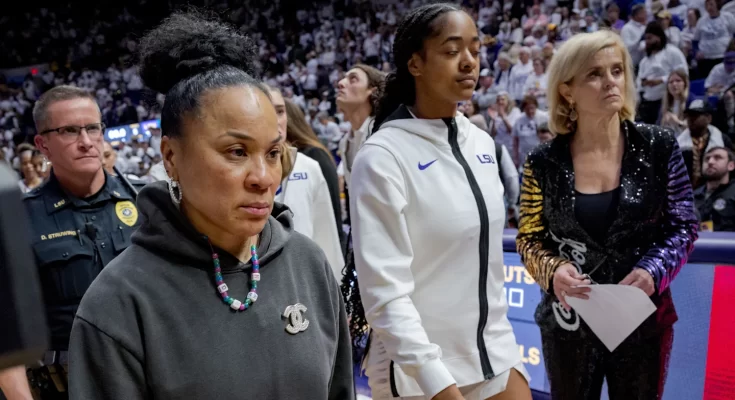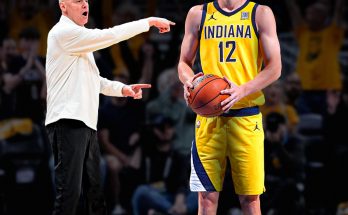Power, Paychecks, and Pressure: Dawn Staley and Kim Mulkey Face New Challenger as Lady Vols’ Coach Joins Millionaire Club
In the ever-evolving world of women’s college basketball, the race at the top is no longer just about championships—it’s about influence, investment, and the rising financial power of coaching elite programs. For years, Dawn Staley of South Carolina and Kim Mulkey of LSU have stood at the center of that conversation. Both icons in their own right, they’ve pushed boundaries, elevated expectations, and set new standards not only in wins and titles but also in paychecks and profile. But now, a new name has officially entered the high-stakes arena of elite women’s college coaching salaries: the newly appointed head coach of the Tennessee Lady Vols, who has just joined the exclusive millionaire club.
With the University of Tennessee’s historic women’s basketball program in the spotlight again, this announcement signals a major shift. The Lady Vols have always carried legacy—names like Pat Summitt still echo in the halls and hearts of the program. But in recent years, their presence on the national stage has waned as other powerhouses have surged forward. Now, the school is putting its money where its ambition is. By awarding its new head coach a contract worth over seven figures annually, Tennessee has declared that it’s no longer content to live off its history. It’s ready to compete in the present—and reshape the future.
This move immediately casts the new Lady Vols coach into the orbit of Staley and Mulkey, whose own coaching salaries have come to symbolize the transformation of women’s college basketball. Once relegated to secondary status in funding and visibility, the sport has undergone a major renaissance over the past decade. TV ratings have soared, NIL deals have reshaped recruiting, and competitive parity has grown. In response, top programs are acting like top programs—rewarding their coaches like CEOs of multi-million-dollar enterprises. And why shouldn’t they? The product on the court demands it. The competition off the court requires it.
Dawn Staley was among the first to kick down that financial door. In 2021, she signed a historic contract extension with South Carolina that made her one of the highest-paid coaches in the country, male or female. It was a landmark moment—both for her and for the sport. But it wasn’t just about money. It was about recognition. About equity. About signaling that excellence on the women’s side of college basketball deserves the same respect, the same investment, and the same reward.
Kim Mulkey, a multiple-time national champion and one of the most colorful and controversial figures in the game, wasn’t far behind. When LSU brought her over from Baylor, they did so with a record-setting contract of their own—an aggressive move by an ambitious athletic department that wanted not just to win, but to dominate. In her first few years, she delivered on that promise in ways only Mulkey can: flamboyant, fearless, and fiercely successful. Her salary and her persona both became symbols of the new era.
Now, with Tennessee stepping into that elite financial tier, the dynamic shifts again. This isn’t just about money—it’s about what that money represents. A program with the tradition of Tennessee choosing to invest at this level is a signal to recruits, donors, and the broader college basketball world: The Lady Vols are serious again. They’re not resting on the legacy of Summitt; they’re building something new, something designed to challenge the Staleys and Mulkeys of the world not just in March, but all season long.
For Staley, who has built South Carolina into a perennial powerhouse from the ground up, the challenge is both familiar and welcome. She’s no stranger to pressure. She thrives in the spotlight. And she knows the landscape is shifting. Every new competitor that rises sharpens her program’s focus. Her reputation as a builder, a leader, and a cultural force remains unmatched. Her players don’t just win games—they become pros, leaders, and role models. That holistic approach continues to make her one of the most respected figures in sports.
Mulkey, on the other hand, brings her own edge to the rivalry. She relishes the noise, fuels the fire, and embraces the chaos. She’s as polarizing as she is successful, and that makes her must-watch. The rise of another well-funded rival—especially one from a program with Tennessee’s pedigree—will likely only intensify her already electric presence. She’s never been one to back down from a challenge, and you can bet she won’t start now.
But the Lady Vols’ move to elevate their coach financially does more than intensify rivalries—it raises the bar for everyone. In a sport where players are increasingly empowered, where social media influence is currency, and where the competition for elite talent is cutthroat, coaching salaries have become part of the recruiting pitch. The message is clear: we value our program, we back our leaders, and we’re playing to win. Recruits and their families take note of those investments. They equate high salaries with stability, with vision, with commitment.
It also pressures other programs—some with recent success, others with long histories—to consider their own investments. Will UConn respond with a raise for Geno Auriemma if Tennessee starts climbing back into Final Four contention? Will rising programs like Iowa, Stanford, or UCLA follow suit if they want to keep up? The era of underpaying top women’s coaches is ending—and the ripple effect is only beginning.
This financial escalation, though, is not without its own set of expectations. When a coach is paid like a superstar, the spotlight intensifies. Every lineup decision is second-guessed, every loss feels heavier, and every postseason result carries added scrutiny. That’s the reality of modern sports—high stakes, high reward, and high pressure. For the new Lady Vols coach, that means stepping into a role that is both thrilling and daunting. She’s being paid like a contender. Now, the results will need to follow.
Still, the broader impact is overwhelmingly positive. As salaries rise, so does the visibility and credibility of the sport. More young women watching see coaching as a viable, lucrative career path. More fans engage with the game year-round. More media coverage flows into the space. It’s all part of a cultural shift that’s been a long time coming. And it’s being led by names like Staley, Mulkey, and now—potentially—the Lady Vols’ newest face of the franchise.
Even beyond the individual schools, the presence of multiple million-dollar coaches in the women’s game creates a more competitive and compelling national landscape. Rivalries will deepen, storylines will grow richer, and parity will continue to evolve. No longer is there a single dominant program running away with the season year after year. Instead, there’s a legitimate arms race underway—and the fans are the winners.
And while the conversation may start with money, it always ends with legacy. Coaches like Staley and Mulkey are already carving theirs in stone. The new Tennessee head coach now enters that arena, not just to coach a team, but to carry a program’s heritage while building something of her own. That’s the power of this moment—it’s not just about chasing wins; it’s about shaping history.
So as the Lady Vols turn a financial page in their storied book, the rest of women’s college basketball will be watching closely. The race is tighter, the numbers are bigger, and the stakes are higher. Dawn Staley and Kim Mulkey now have company at the top—and the game, as always, is better for it.



